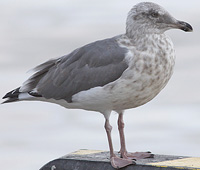 Slaty-backed Gull (schistisagus) / オオセグロカモメ / 큰재갈매기
Slaty-backed Gull (schistisagus) / オオセグロカモメ / 큰재갈매기
(last update: December 2015)
Slaty-backed Gull (schistisagus) 3rd basic moult / 3CY September
Birds in the last stage of the second complete moult, replacing all flight feathers for 3rd generation. The new outer primaries are already visible, also in resting birds. Outermost P9 and P10 still have to grow to full length.
Moult gaps in the wing-coverts are closed, when the central greater coverts are replaced and the small feathers in the carpal edge are renewed.
Secondaries and rectrices are in active moult; the secondaries are replaced by two moult waves. One moult wave from the body outwards, and another moult wave from S1 inwards. These two waves will meet at about S16-S17. Tail feathers are replaced centrifugal; the central feathers are dropped first and the outer rectrices last in line.
In general these are adult-like birds, with obvious immature markings. Ageing can be difficult at this age, especially between 3CY and 4CY birds. As long as old 2nd gen outer primaries are still present, 3CY birds are easily aged. Immature birds with extensive black in the tail and extensive brown wing-covert patches should normally also be in 3CY. However, when old primaries are shed and can not be used in ageing, advanced 3CY and retarded 4CY birds are extremely similar, and such birds are probably best labelled "sub-adult".
 Slaty-backed Gull (schistisagus) 3rd cycle (3CY), September 15 2009, Nemuro, Hokkaido, Japan. Picture: Hannu Huhtinen.
Slaty-backed Gull (schistisagus) 3rd cycle (3CY), September 15 2009, Nemuro, Hokkaido, Japan. Picture: Hannu Huhtinen. Slaty-backed Gull (schistisagus) 3rd cycle (3CY), September 16 2009, Hokkaido, Japan. Picture: Hannu Huhtinen.
Slaty-backed Gull (schistisagus) 3rd cycle (3CY), September 16 2009, Hokkaido, Japan. Picture: Hannu Huhtinen. Slaty-backed Gull (schistisagus) 3rd cycle (3CY), September 16 2009, Hokkaido, Japan. Picture: Hannu Huhtinen.
Slaty-backed Gull (schistisagus) 3rd cycle (3CY), September 16 2009, Hokkaido, Japan. Picture: Hannu Huhtinen. Slaty-backed Gull (schistisagus) 3rd cycle (3CY), September 16 2009, Hokkaido, Japan. Picture: Hannu Huhtinen.
Slaty-backed Gull (schistisagus) 3rd cycle (3CY), September 16 2009, Hokkaido, Japan. Picture: Hannu Huhtinen.